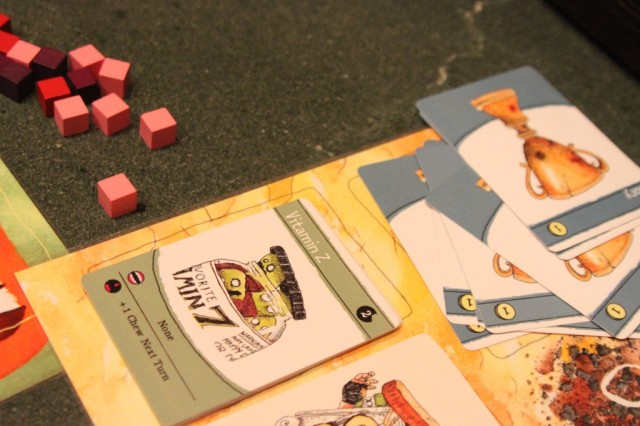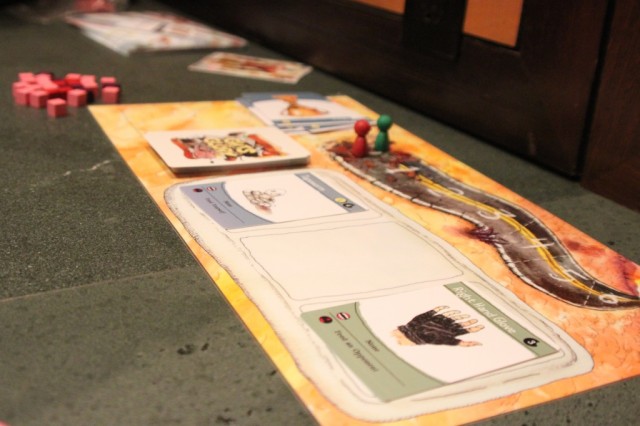
When you get down to it, designing a good card or board game is about maintaining a careful balance between luck and skill. Too much luck, and you end up with a children's game like Candy Land or War, where there's literally nothing a player can do to change the outcome once the cards are shuffled. Rely too much skill, and you end up with a game like Chess or Go that's incredibly deep but also incredibly inaccessible to beginners. The most satisfying physical games, to me, are the ones that fall as close as possible to the middle of the continuum between the two extremes of complete luck and complete skill basis. Guts of Glory manages this balance almost perfectly.
Indie game designer Zach Gage (perhaps best known for excellent iOS puzzle title SpellTower) told me at PAX that he originally conceived Guts of Glory as a game where the last humans on earth scrounged for nutrients, arranging Tetris-shaped pieces of food into the limited space in their stomachs. That idea eventually evolved into the high-level concept of a competition to become the best eater in a post-apocalyptic world where standard edible food is at a minimum, with the Tetris pieces replaced by illustrated cards.
Thus, every turn in Guts of Glory starts by filling up a three-card plate from the top of the deck with "foods" and "condiments" like bleach, tapeworms, a box of spiders and the dreaded "Tire of Doom." You then choose one card to put in your five-card-capacity "mouth," and choose how to distribute two "chew tokens" over the cards currently in that mouth. Once a card has been chewed enough (the precise level varies by the card), you swallow it, which can provide the glory points you need to win and/or cause other effects on the game, both positive and negative.
It seems pretty straightforward, but by the middle of the game your mouth will undoubtedly start to fill up with semi-chewed food and condiments, leaving no room for the additional cards you have to keep stuffing in each turn. At this point, you're forced to choose and "spew" a card to an opponent, giving them the benefit of your previous chewing plus the bonus of an extra glory point if and when they swallow that card. The latter half of most games of Guts of Glory is characterized by a hectic effort to manage limited mouth space, with players spewing and re-spewing cards back and forth and carefully considering how to limit the damage they're doing to themselves and the advantage they're giving their opponents.

Guts of Glory isn't just a mindless race to swallow cards as quickly as possible, though. Some cards provide benefits (and, occasionally, penalties) when they sit in your mouth, forcing a sometimes delicate decision of when to go for a swallow and when to clog up your mouth with partially chewed food. Some cards also let you mess with your opponents' plans by, for example, removing all the chew tokens from a card or forcing a player to swallow a particularly helpful condiment. This potential for mischief forces players to keep full situational awareness of what's going on in each player's mouth, and to try to predict what's likely to happen over the next few turns.
The basic strategy is simple enough that players should be able to pick up the basics after just a few turns, but there are deeper layers that can be exploited by players that develop knowledge of the available cards and how to combine them synergistically (the beta deck I was given to review has 50 total cards, including some duplicates, but you can choose to play with just a small subset of those if you want). There's no one dominant strategy for how to play; rather, you often have to adjust your play style between offense and defense on the fly depending on what cards come off the deck and onto your plate. Every decision comes with a hefty opportunity cost, and whether the choice works out in your favor depends a lot on what card comes up next.
It's that element of randomness that helps keep Guts of Glory interesting even between players of vastly different skill levels. Every game I've played has seen the overall lead change numerous times, including quite a few games where one player came back from a signficant deficit to pull out a last-second win. These turnarounds weren't just blind luck, but a combination of careful resource manipulation and some crucial draws. Even when you're way behind, you rarely feel like a win is out of the realm of possibility in a game of Guts of Glory, which is pretty much the definition of an engaging competitive game.
Gage just made his $25,000 goal in Kickstarter funding for the game as of this writing, and I encourage anyone with interest in card games to send the effort some love. If you're still skeptical, though, you can print out a free PDF sample deck to try the game out before making a pledge.
reader comments
21